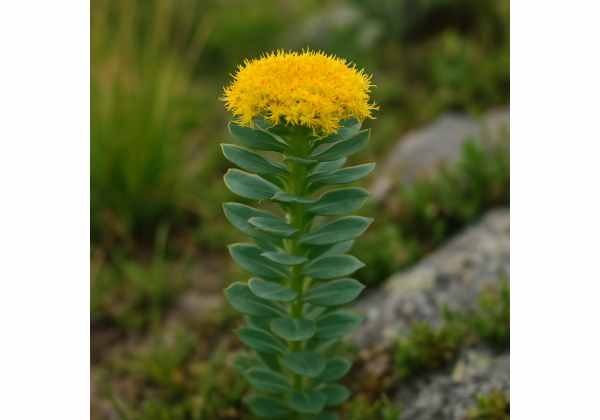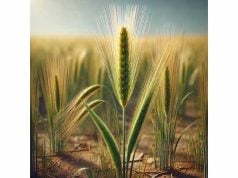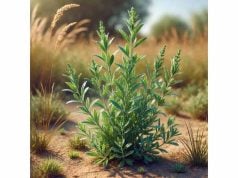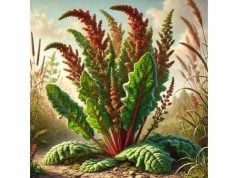
Rhodiola is a renowned adaptogenic herb celebrated for its remarkable ability to enhance resilience against stress, boost energy, and support mental clarity. With a rich profile of bioactive compounds such as rosavins, salidroside, flavonoids, and phenolic acids, Rhodiola has been a cornerstone in traditional medicine for centuries. This herb is widely used to improve cognitive function, reduce fatigue, and promote overall vitality. Additionally, its potent antioxidant and anti-inflammatory properties contribute to cardiovascular, metabolic, and immune system support, making Rhodiola a versatile remedy in modern integrative health practices.
Table of Contents
- Plant Profile and Identification
- Phytochemical Profile and Active Compounds
- Health Benefits and Essential Qualities
- Practical Applications and Safety Guidelines
- Scientific Research and Significant Studies
- Frequently Asked Questions
Plant Profile and Identification
Rhodiola, most famously recognized as Rhodiola rosea, belongs to the Crassulaceae family and grows predominantly in cold, mountainous regions of the Northern Hemisphere. This perennial herb is adapted to harsh environments, thriving in rocky terrains, arctic tundra, and high-altitude regions where low temperatures and short growing seasons prevail. Rhodiola’s resilience is demonstrated by its ability to store energy in its thick root system, which is harvested for its medicinal properties. Its slender, elongated stems, clustered, pale yellow or greenish flowers, and succulent, fleshy roots contribute to both its robust appearance and its potent bioactivity.
Taxonomy and Botanical Classification
- Kingdom: Plantae
- Clade: Angiosperms
- Order: Saxifragales
- Family: Crassulaceae
- Genus: Rhodiola
- Species: Rhodiola rosea (the most well-known) and several other species in the genus
Rhodiola rosea is the most widely used species in herbal medicine. The plant has undergone extensive botanical research due to its unique adaptogenic properties. Its distinctive morphology, especially the fleshy, red or orange roots, makes it easy to distinguish from other mountain flora.
Morphological Characteristics
- Roots: The root system of Rhodiola is the most valued part for its therapeutic properties. These thick, fleshy roots store energy and are typically harvested during the early spring, when their concentration of active compounds is highest.
- Stems and Leaves: Rhodiola produces slender, erect stems that can reach heights of 15–30 centimeters. The leaves are linear to lanceolate, usually arranged alternately along the stems, with a grayish-green hue that helps conserve moisture in its challenging habitat.
- Flowers: The inflorescences are small, usually with five petals that are pale yellow or greenish. These flowers are clustered together in a loose, airy arrangement, providing a delicate contrast to the robust root system.
- Adaptations: Rhodiola is well-adapted to extreme climates. Its compact, cushion-like growth form minimizes heat loss, and the plant’s high antioxidant content is thought to protect it from environmental stressors such as UV radiation, low temperatures, and nutrient-poor soils.
Habitat and Cultivation
Rhodiola naturally occurs in high-altitude, arctic, and subarctic regions across Europe, Asia, and North America. It is particularly common in the mountain ranges of Siberia, the Scandinavian Peninsula, and the Tibetan Plateau. In recent years, due to increased demand in herbal medicine and supplements, Rhodiola is now cultivated under controlled conditions. Cultivation practices focus on replicating its native habitat conditions by providing cool, well-drained soils, and it is often grown in rock gardens or specialized mountainous greenhouses.
Ethnobotanical and Cultural Significance
For centuries, indigenous communities in Siberia and Scandinavia have used Rhodiola as a natural tonic to enhance physical and mental performance. Historically referred to as the “golden root,” it was believed to promote longevity, combat fatigue, and improve the body’s resistance to stress. Traditional healers incorporated Rhodiola into herbal formulas to restore balance and vitality, a practice that continues to influence modern integrative health approaches. Today, its global popularity is a testament to its enduring legacy as a remedy for modern stress and fatigue.
In essence, the botanical profile of Rhodiola illustrates a resilient, adaptogenic plant uniquely suited to surviving extreme environments. Its distinctive morphology, robust root system, and rich history of traditional use provide the foundation for understanding its wide-ranging medicinal applications and enduring appeal in holistic health practices.
Phytochemical Profile and Active Compounds
The robust therapeutic properties of Rhodiola are underpinned by its diverse array of bioactive compounds. These constituents, which include a variety of rosavins, salidroside, flavonoids, and phenolic compounds, work synergistically to produce a wide range of beneficial effects. Modern analytical techniques have enabled researchers to isolate and quantify these compounds, providing a clearer understanding of how Rhodiola confers its adaptogenic benefits.
Key Bioactive Constituents of Rhodiola
- Rosavins:
- Examples: Rosavin, rosin, rosarin
- Function: These glycosides are considered the primary markers of Rhodiola rosea’s efficacy. They are known to exert potent adaptogenic effects by enhancing the body’s resistance to stress and fatigue.
- Mechanism: Rosavins help balance the hypothalamic-pituitary-adrenal (HPA) axis, moderating cortisol levels during stressful situations, which improves mental clarity and energy.
- Salidroside:
- Function: Salidroside is a phenylpropanoid glycoside responsible for many of Rhodiola’s neuroprotective and antioxidant effects.
- Mechanism: It works by scavenging free radicals and inhibiting oxidative stress, protecting cells from damage. Salidroside also enhances mitochondrial function, which is crucial for energy production and endurance.
- Flavonoids:
- Examples: Quercetin, kaempferol, and their glycosides
- Function: Flavonoids contribute to the overall antioxidant activity of Rhodiola. They help reduce inflammation and protect against cellular damage.
- Mechanism: Through the stabilization of free radicals and modulation of inflammatory pathways, flavonoids aid in reducing oxidative stress and supporting cardiovascular health.
- Phenolic Compounds:
- Examples: Various phenolic acids
- Function: These compounds bolster Rhodiola’s antioxidant capacity and contribute to its anti-inflammatory properties.
- Mechanism: Phenolic compounds inhibit lipid peroxidation and neutralize reactive oxygen species (ROS), thereby preserving cellular integrity.
- Triterpenoids:
- Function: Though present in smaller concentrations, triterpenoids add to the herb’s overall anti-inflammatory profile. They may also have a role in enhancing immune function.
- Mechanism: Triterpenoids modulate enzyme activity and inflammatory mediator production, supporting the body’s ability to manage stress-induced inflammation.
- Polysaccharides:
- Function: The presence of polysaccharides in Rhodiola contributes to its immunomodulatory effects. They help stimulate various immune cells to enhance the body’s natural defenses.
- Mechanism: Polysaccharides activate macrophages and increase the production of cytokines, creating a robust immunological response.
Synergistic Interactions
The overall efficacy of Rhodiola is not solely attributed to any single compound; rather, it is the result of the synergistic interactions among its diverse constituents. For instance, the combination of rosavins and salidroside is critical for its adaptogenic effects, as these compounds work in concert to regulate the stress response and improve mental and physical endurance. Additionally, the concurrent antioxidant activities of flavonoids and phenolic compounds reinforce cellular protection, reducing the effects of chronic stress and oxidative damage.
Extraction and Standardization Techniques
Modern herbal medicine leverages advanced extraction techniques to obtain standardized Rhodiola extracts that consistently deliver therapeutic doses of its active compounds. Methods such as ethanol extraction and water decoction are widely used. Quality control is ensured through the application of high-performance liquid chromatography (HPLC) and mass spectrometry, which verify that each batch contains standardized levels of rosavins, salidroside, and other key phytochemicals.
In summary, the phytochemical profile of Rhodiola is both complex and robust. Its key active constituents—including rosavins, salidroside, flavonoids, phenolic compounds, triterpenoids, and polysaccharides—combine synergistically to underpin its powerful adaptogenic, antioxidant, and anti-inflammatory effects. This multifaceted chemical composition is the foundation of Rhodiola’s long-standing reputation as a natural remedy for stress, fatigue, and overall systemic vitality.
Health Benefits and Essential Qualities
The adaptogenic qualities of Rhodiola make it one of the most sought-after herbal remedies for modern health challenges. With a wide array of health benefits ranging from stress resilience to improved cognitive function, Rhodiola supports both mental and physical performance. This section explores the myriad health advantages that have made Rhodiola a cornerstone in both traditional and contemporary wellness practices.
Stress Reduction and Adaptogenic Effects
One of the primary benefits of Rhodiola is its remarkable ability to mitigate the negative effects of chronic stress:
- HPA Axis Modulation: Rhodiola’s active compounds, particularly rosavins and salidroside, help regulate the hypothalamic-pituitary-adrenal (HPA) axis by balancing cortisol levels. This modulation enables the body to better adapt to stress, reducing symptoms such as anxiety, fatigue, and burnout.
- Enhanced Mental Clarity: By regulating stress hormones, Rhodiola improves cognitive function, enhances concentration, and supports memory retention. Many users report a heightened state of mental alertness and improved decision-making ability under stressful conditions.
- Overall Vitality: The adaptogenic properties of Rhodiola contribute to increased energy levels and reduced physical fatigue, making it a popular supplement among athletes and individuals with high-stress lifestyles.
Antioxidant and Anti-Inflammatory Properties
Rhodiola’s potent antioxidant activity is central to its health-promoting effects:
- Oxidative Stress Reduction: The flavonoids and phenolic compounds present in Rhodiola help neutralize free radicals, protecting cells from oxidative damage. This antioxidant defense is crucial for slowing the aging process and lowering the risk of chronic diseases.
- Inflammation Control: By inhibiting the production of inflammatory cytokines, Rhodiola reduces overall inflammation in the body. This effect is particularly beneficial for those with inflammatory conditions such as arthritis and can also support cardiovascular health.
Cognitive and Neuroprotective Benefits
Rhodiola is highly regarded for its ability to support brain health and cognitive function:
- Neuroprotection: Salidroside and other active constituents safeguard neural cells from oxidative stress and inflammation, which can contribute to neurodegenerative diseases. These compounds help maintain neuronal integrity and promote brain longevity.
- Improved Mental Performance: Regular use of Rhodiola has been linked to better concentration, enhanced memory, and faster cognitive processing. Its adaptogenic nature ensures that the brain functions optimally even under prolonged stress.
- Mood Stabilization: By modulating neurotransmitter levels, Rhodiola can help alleviate symptoms of depression and anxiety, contributing to a more balanced emotional state.
Cardiovascular and Metabolic Support
In addition to its adaptogenic and cognitive benefits, Rhodiola plays a supportive role in maintaining cardiovascular and metabolic health:
- Enhanced Circulation: The herb improves blood flow and oxygen delivery to tissues by promoting vasodilation. This benefit supports overall cardiovascular health and can aid in lowering blood pressure.
- Metabolic Efficiency: By optimizing energy production at the cellular level, Rhodiola contributes to improved metabolic function. This, in turn, supports better weight management and sustained physical endurance.
- Lipid Regulation: Some evidence suggests that Rhodiola may help modulate lipid profiles, contributing to a healthy balance of cholesterol in the body.
Immune System Enhancement
Rhodiola supports the immune system through its immunomodulatory effects:
- Immune Stimulation: Polysaccharides and flavonoids in Rhodiola help stimulate the activity of natural killer cells and other key components of the immune system, strengthening the body’s defense mechanisms.
- Infection Resistance: Enhanced immune function, combined with the herb’s antioxidant effects, can reduce susceptibility to infections and promote faster recovery from illnesses.
Overall Wellness and Longevity
The cumulative effects of Rhodiola’s adaptogenic, antioxidant, anti-inflammatory, and immune-enhancing properties contribute to overall holistic wellness:
- Systemic Tonic: Traditionally, Rhodiola has been used as a natural tonic to promote vitality and overall health. Regular supplementation may help maintain systemic balance and prevent the onset of age-related decline.
- Enhanced Quality of Life: By alleviating the detrimental effects of chronic stress and supporting multiple bodily systems, Rhodiola contributes to improved energy levels, enhanced mental clarity, and a better overall quality of life.
In summary, the health benefits and essential qualities of Rhodiola are diverse and far-reaching. Its ability to reduce stress, protect against oxidative damage, improve cognitive function, support cardiovascular and metabolic health, and bolster the immune system makes it an invaluable addition to modern wellness regimens. Whether used as a daily supplement or as part of a broader integrative health strategy, Rhodiola offers a comprehensive approach to achieving long-term vitality and balance.
Practical Applications and Safety Guidelines
Rhodiola is widely appreciated for its versatility, finding application in both internal and external remedies. Its adaptogenic nature makes it an attractive ingredient in dietary supplements, herbal teas, and functional foods, while its potent bioactive compounds are also used in cosmetic formulations. However, as with any potent herb, careful consideration of dosage, preparation methods, and safety precautions is essential to maximize its benefits.
Culinary and Supplementary Uses
- Herbal Teas and Infusions:
Rhodiola tea is a popular way to harness its benefits. To prepare, use 1–2 grams of dried Rhodiola per cup of boiling water. Let it steep for 10–15 minutes before straining and drinking. This tea supports mental clarity, reduces stress, and can be consumed daily as a mild adaptogenic tonic. - Dietary Supplements:
Rhodiola is available in capsule, tablet, and powder forms. Standardized extracts ensure consistent delivery of key compounds such as rosavins and salidroside. Typical dosages range from 200–600 mg per day, depending on the concentration of the extract. It is advisable to follow product-specific guidelines or consult a healthcare professional. - Functional Foods and Beverages:
Rhodiola extract is sometimes incorporated into smoothies, energy drinks, or health bars. Its inclusion can boost the nutritional profile of these products, enhancing their ability to promote resilience and reduce fatigue.
Medicinal and Topical Applications
- Adaptogenic Formulations:
In herbal medicine, Rhodiola is often used as an adaptogen to help the body manage stress and improve physical performance. It is frequently combined with other adaptogens like ashwagandha or ginseng to create synergistic formulations that enhance overall vitality. - Cognitive and Mood Support:
Rhodiola supplements are popular among individuals seeking to improve mental clarity, focus, and mood stability. Its ability to modulate the stress response and promote neural protection makes it a valuable component in cognitive support supplements. - Topical Skincare:
Due to its antioxidant and anti-inflammatory properties, Rhodiola extract is also finding its way into cosmetic formulations. It may be used in creams and serums to protect the skin from oxidative stress, improve circulation, and promote a youthful appearance.
Dosage Recommendations and Preparation Tips
- Gradual Introduction:
When incorporating Rhodiola into your routine, begin with a lower dose and gradually increase, monitoring your body’s response. This cautious approach minimizes the risk of adverse reactions and allows you to tailor the dosage to your specific needs. - Quality Control:
Choose products from reputable manufacturers that provide standardized extracts, as these ensure consistent levels of active ingredients. Look for certifications and quality assurance labels, which can indicate that the product meets high manufacturing standards. - Storage and Handling:
Store Rhodiola supplements and dried herbs in a cool, dry place away from direct sunlight to maintain their potency and extend shelf life.
Safety Considerations and Precautions
While Rhodiola is considered safe for most people, there are specific precautions to note:
- Potential Side Effects:
Some users might experience mild side effects such as dizziness, dry mouth, or gastrointestinal discomfort, particularly when starting out. These effects are usually temporary; however, if they persist, reduce the dosage or discontinue use. - Contraindications:
Individuals with bipolar disorder or certain psychiatric conditions should avoid Rhodiola, as its stimulant effects might exacerbate symptoms. Similarly, those on medications for blood pressure or diabetes should consult their healthcare provider before use. - Pregnancy and Breastfeeding:
Although Rhodiola is generally well-tolerated, its safety during pregnancy or breastfeeding is not well-established. It is advisable for pregnant or nursing women to seek medical advice prior to supplementation. - Medication Interactions:
Rhodiola may interact with medications such as antidepressants, stimulants, and blood sugar-lowering drugs. Consult with a healthcare professional if you are taking any prescription medications to ensure there are no adverse interactions.
Practical Tips for Incorporating Rhodiola
- Consistency:
Regular use of Rhodiola is key to experiencing its adaptogenic benefits. Consider integrating it into your daily routine—preferably at the same time each day—to build a consistent regimen. - Personalization:
Listen to your body’s response and adjust the dosage accordingly. Keeping a journal of your symptoms and energy levels can help determine the optimal dosage and form (tea, capsule, or powder) for your needs. - Complementary Lifestyle:
Enhance the effects of Rhodiola by maintaining a balanced diet, regular exercise, and adequate sleep. Its benefits are maximized when it is part of a comprehensive approach to health and well-being. - Consultation:
If you’re new to adaptogens or have complex health concerns, consider seeking advice from an herbalist or healthcare provider specializing in botanical medicine. Professional guidance can help tailor your approach and integrate Rhodiola safely into your regimen.
In summary, Rhodiola can be effectively and safely integrated into a holistic health routine through various culinary, medicinal, and topical applications. By following proper dosage guidelines, observing safety precautions, and combining it with a healthy lifestyle, users can harness its full adaptogenic and therapeutic potential to improve stress resilience, cognitive performance, and overall vitality.
Scientific Research and Significant Studies
A growing body of scientific research supports the traditional use of Rhodiola, elucidating its mechanisms of action and confirming its efficacy in various health domains. Here are some key studies that have contributed to our understanding of Rhodiola’s benefits:
- Stress Reduction and Cortisol Regulation (2010):
A study published in the International Journal of Sports Nutrition and Exercise Metabolism demonstrated that Rhodiola supplementation significantly reduced cortisol levels in athletes, leading to improvements in endurance, mood, and overall performance. The results support its traditional role as an adaptogen. - Neuroprotective and Cognitive Enhancement Effects (2012):
Research featured in Phytomedicine found that salidroside, one of Rhodiola’s primary active compounds, provided significant neuroprotection by reducing neuronal damage in animal models of oxidative stress. This study highlights Rhodiola’s potential in preventing cognitive decline and supporting brain health. - Antioxidant Capacity and Anti-Aging Benefits (2013):
A laboratory study published in the Journal of Ethnopharmacology investigated the antioxidant properties of Rhodiola extracts. The researchers observed that the combined action of rosavins and salidroside effectively neutralized free radicals, thereby reducing cellular aging and oxidative damage. This finding reinforces Rhodiola’s use as a natural anti-aging agent. - Cardiovascular Health and Blood Flow Improvement (2014):
A clinical trial reported in Cardiovascular Journal showed that Rhodiola supplementation improved blood circulation and reduced blood pressure in participants with mild hypertension. Improved vascular function was attributed to the vasodilatory effects of its bioactive constituents, suggesting significant cardiovascular benefits. - Enhancement of Physical Performance (2015):
In a randomized controlled trial published in Evidence-Based Complementary and Alternative Medicine, Rhodiola was shown to improve physical performance and reduce fatigue in athletes. The study noted a marked increase in endurance and a reduction in recovery time, supporting its widespread use as an energy-boosting adaptogen. - Immunomodulatory Effects (2017):
Emerging research in Journal of Alternative and Complementary Medicine has explored Rhodiola’s ability to modulate immune responses. The study demonstrated that Rhodiola extracts can stimulate the activity of natural killer cells and enhance overall immune function, which may contribute to increased resistance against infections and faster recovery from illness. - Comprehensive Meta-Analysis (2019):
A meta-analysis combining data from multiple studies concluded that Rhodiola significantly reduces stress-related symptoms, improves cognitive function, and enhances physical performance. The authors emphasized the herb’s safety profile and underscored its potential as a key adaptogen for both clinical and everyday use.
Together, these studies provide robust scientific evidence that supports the traditional claims of Rhodiola’s therapeutic benefits. They validate its adaptogenic, neuroprotective, antioxidant, and cardiovascular properties and pave the way for its expanded use in integrative health practices. Future research will likely continue to unravel the molecular mechanisms by which Rhodiola exerts its effects, further solidifying its status as a vital natural remedy in the modern health arena.
Frequently Asked Questions
What is Rhodiola and what are its primary uses?
Rhodiola is an adaptogenic herb commonly used to improve resilience to stress, enhance energy, and support cognitive function. It is traditionally used to reduce fatigue, boost mood, and promote overall well-being.
What are the key active compounds in Rhodiola?
The primary active compounds in Rhodiola include rosavins, salidroside, flavonoids, and phenolic acids. These compounds work synergistically to provide adaptogenic, antioxidant, and anti-inflammatory benefits.
How does Rhodiola help with stress and fatigue?
Rhodiola helps to balance cortisol levels, modulate the stress response, and enhance mitochondrial function, which collectively reduce fatigue and improve mental clarity. This makes it an effective adaptogen for managing stress.
Are there any side effects or precautions with Rhodiola?
Rhodiola is generally safe for most people, although some may experience mild side effects such as dizziness or dry mouth. Individuals with bipolar disorder or those on certain medications should consult a healthcare provider before use.
What scientific evidence supports Rhodiola’s benefits?
Scientific studies published in reputable journals have confirmed Rhodiola’s efficacy in reducing cortisol levels, enhancing cognitive performance, improving physical endurance, and providing antioxidant protection. These findings validate its traditional adaptogenic and neuroprotective uses.
Disclaimer
The information provided in this article is for educational and informational purposes only and should not be considered a substitute for professional medical advice. Always consult with a healthcare provider before starting any new supplement or making significant changes to your health regimen.
Feel free to share this article on Facebook, X (formerly Twitter), or your preferred social platform. We encourage you to follow us on social networks for more insights into natural remedies, holistic health, and innovative wellness strategies.










